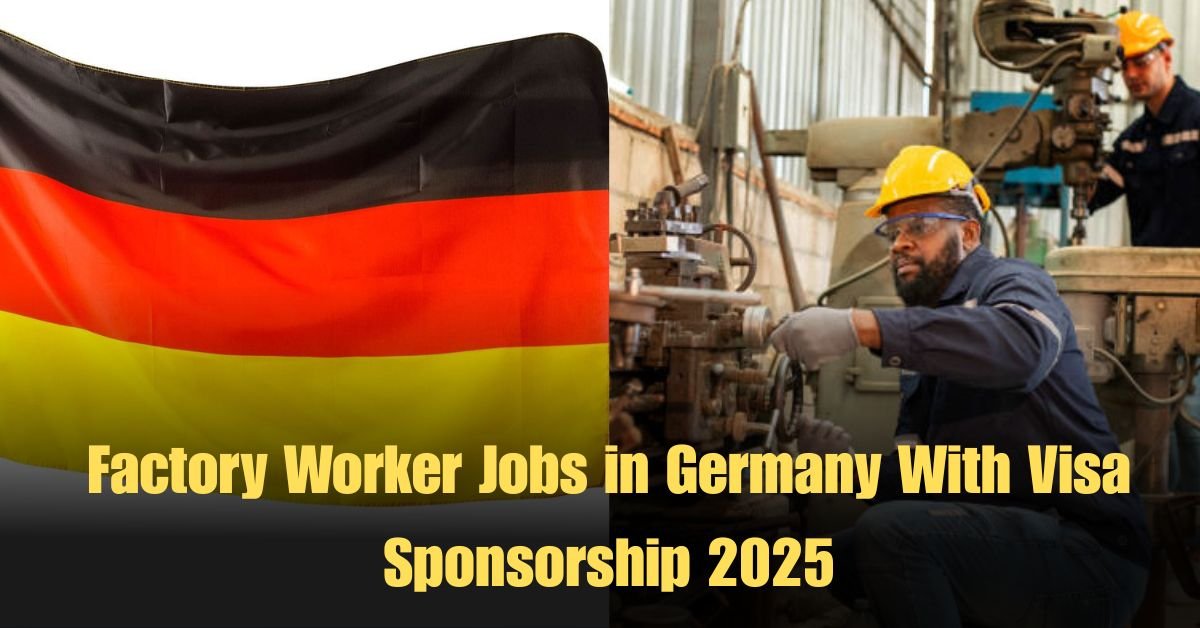Are you dreaming of working in Germany without a degree but don’t know where to start? The good news factory worker jobs in Germany with visa sponsorship 2025 are opening new doors for international applicants. Germany booming manufacturing sector is actively hiring foreign workers, offering relocation assistance, sponsored work permits, and entry-level opportunities.
In this guide, you will discover everything about factory job vacancies in Germany 2025, how to apply for visa sponsorship jobs in Germany for foreigners, eligibility requirements, salary expectations, and insider tips to increase your chances of getting hired.
Why Germany Needs Factory Workers in 2025
Germany is home to global manufacturing giants like BMW, Volkswagen, Siemens, and Bosch, but labor shortages are pushing employers to recruit skilled and unskilled foreign workers.
According to the German Federal Employment Agency (BA):
- Over 1.8 million jobs remain unfilled in 2025, especially in labor-intensive industries.
- Factory workers, machine operators, and warehouse assistants are among the most in-demand roles.
- Companies are offering visa sponsorship and relocation packages to attract international workers.
This means foreigners without a degree can now secure high-demand jobs in Germany with full immigration support.
Benefits of Factory Worker Jobs in Germany with Visa Sponsorship
Working as a factory worker in Germany comes with numerous perks:
- Visa Sponsorship – Employers assist with Germany’s work visa application.
- Competitive Salaries – Average monthly pay for factory workers ranges from €2,200 – €3,000.
- Job Security – Manufacturing is a pillar of Germany’s economy.
- Relocation Assistance – Some companies cover housing, flights, and insurance.
- Career Growth – Opportunities to upskill into technician or supervisory roles.
Eligibility Requirements
While unskilled jobs in Germany with visa support are available, applicants must meet basic criteria:
- Valid passport and clean background record
- Basic knowledge of English or German (A2–B1 preferred)
- Willingness to work in shift-based environments
- Minimum secondary school education (some roles require none)
Tip: Learning German increases your chances of selection by 60%.
How to Apply for Factory Worker Jobs in Germany With Visa Sponsorship 2025
Here a step-by-step process:
1. Search Verified Job Portals
Look for factory jobs in Europe with visa sponsorship on:
- EU Job Mobility Portal
- Make It In Germany – Official German government portal
- Company career pages (e.g., Volkswagen, BMW, BASF)
2. Prepare Documents
- Updated CV (Europass format)
- Cover letter highlighting factory work experience
- Copies of certificates and diplomas
- Passport + professional references
3. Attend Interviews (Online/Offline)
Employers may conduct virtual interviews before issuing a job contract.
4. Apply for a Germany Work Visa
Submit your contract and documents at the German Embassy/Consulate in your country.
Salary Expectations for Factory Workers in Germany
| Job Role | Average Monthly Salary (€) | Visa Sponsorship |
|---|---|---|
| Factory Worker (Entry-Level) | 2,200 – 2,500 | Available |
| Machine Operator | 2,500 – 3,000 | Available |
| Warehouse Assistant | 2,200 – 2,600 | Available |
| Packaging Worker | 2,100 – 2,400 | Available |
| Shift Supervisor | 3,200 – 3,800 | Available |
FAQs
1. Can I get a factory job in Germany without a degree?
Yes, many entry-level jobs in Germany for international workers require only basic education.
2. Do I need German language skills?
Not mandatory, but knowing basic German (A2) greatly improves hiring chances.
3. Are these jobs permanent or contract-based?
Both exist. Many employers offer long-term contracts with residency pathways.
4. Is relocation assistance included?
Yes, many employers cover housing, travel, and insurance costs.
Conclusion
Factory worker jobs in Germany with visa sponsorship 2025 are a golden opportunity for foreigners seeking a stable career in Europe. Whether you’re looking for unskilled jobs with relocation support or planning to grow in Germany’s manufacturing sector, this is your chance to build a better future.
